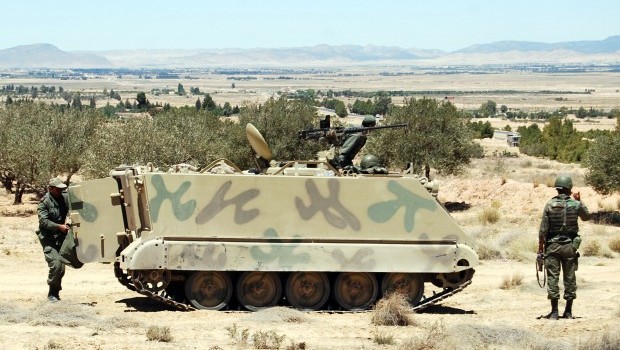
Tunisian soldiers stand guard on June 11, 2013 in the Mount Chaambi region (AFP Photo/Abderrazek Khlifi)
Thousands of troops have deployed in the remote area to scour the mountains, where the militants are holed up, some since a French military operation drove Al-Qaeda-affiliated fighters out of Mali last year.
Analysts said the operation, which Algeria was reinforcing on its side of the border, was a shift to a more pro-active strategy in Tunisia, where Islamist violence risks damaging the transition to democracy after the 2011 “Arab Spring” uprising.
“We’re making progress on terrorism, we are attacking them in their stronghold now and we are moving to the highest point of the mountains,” Prime Minister Mehdi Jomaa told reporters at the weekend.
The mountain range is tough terrain with access into Algeria.
Tunisian forces conducted several raids there and have occasionally bombarded mountain caves after eight soldiers were killed and had their throats slit last year.
One of the Arab world’s most secular states, Tunisia has adopted a new constitution and a caretaker government has taken over as a way to ease tensions between a leading Islamist party and secular opponents until elections due later this year.
Tunisian security officials estimate the numbers in the mountains are only in the dozens, but the threat of Islamist violence is clear.
One militant group, Ansar Al-Sharia, is branded a terrorist group by Washington and has clashed repeatedly with security forces.
Some of those in Chaambi are linked to Al-Qaeda in the Islamic Maghreb (AQIM), Al-Qaeda’s North Africa branch.
A suicide bomber also blew himself up at a beach resort last year—the first such attack in a decade—and shock for a small country heavily reliant on foreign tourism for its foreign currency income.
Taoufik Rahmouni, the army spokesman, told local radio the operation in Mount Chaambi was the largest in the history of the army, because it includes many units, including marines, army, and warplanes and helicopters.
Rahmouni said the army planned to run the operation until it had taken control of the mountain range, which this month was declared a closed military zone to restrict public access to the area.
Algeria’s military, with years of experience battling their own Islamist militancy, have also been coordinating on their side of the frontier, especially with sharing intelligence.
“Algeria will certainly be putting up a block to stop any possible infiltration of terrorists into their territory, but never to go beyond its frontiers,” an Algerian security source said, asking not to be identified.
Algeria has its own security concerns. A militant ambush on a military patrol killed 14 soldiers just east of Algiers last week in one of the worst attacks on the country’s security forces in years. Officials blamed AQIM for the attack.
Since the end of its 1990s war with armed Islamists, attacks have been rarer in Algeria. But Algerian and Tunisian officials are concerned about a spillover from the turmoil in neighboring Libya, where fighters linked to Al-Qaeda take refuge in the southern deserts.
But even with strong border cooperation and air support, Tunisia’s troops may struggle to quickly take Chaambi, analysts said. Improvised landmines and a porous border complicate tracking militants who use the area as a training ground.
“The Chaambi battle will not be final step…but it will be crucial because it hits their stronghold,” said Nasr Ben Soltana, a Tunisian security specialist. “The battle will not be for a few weeks, it will take longer…maybe months.”
